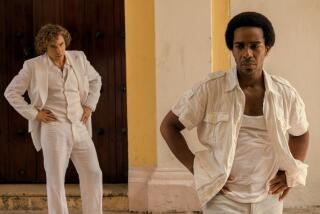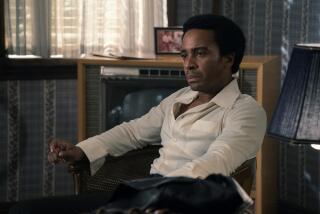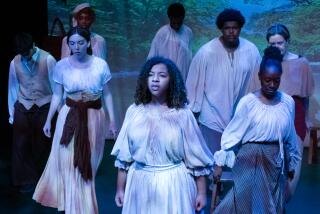Which Newton Should We Recall?
- Share via
Perhaps it was inevitable that Black Panther founder Huey Newton would be put on stage (“Taking Huey Newton Off Posters and Onto the Stage,” Calendar, Jan. 19).
Society’s social rebels often become the stuff of books, paintings, plays or films. The problem is that they are either demonized or idolized. This could easily happen with the Panthers. Their story is loaded with tragedy, heroism, idealism and stupidity.
Actor-playwright Roger Guenveur Smith tries to avoid romanticizing or trashing the Panther legacy in his one-man play, “A Huey P. Newton Story.” He studied Newton’s personal papers and speeches. He talked with family members to get a genuine feel for the man. This is the right way to culturally deconstruct a controversial figure.
But I’m not sure others will follow Smith’s example. Look at what happened to Malcolm X and Martin Luther King Jr. Despite the wild difference in their political views, King and Malcolm are still the best-known symbols of 1960s-style black activism. And each has suffered badly in the historic retelling of their lives.
The “I Have a Dream” King comes to us wrapped in syrupy nostalgia. He is a gentle racial reformer whose vision of change is limited to peace and nonviolence. The King who championed poor people’s organizing, demanded the redistribution of wealth, supported draft resistance, opposed the Vietnam War and was the target of intensive government surveillance is virtually unknown today.
Malcolm was glorified by rappers, overhyped by the fashion industry, packaged and sanitized by Madison Avenue and defanged politically by politicians and media celebrities. Hollywood transformed him into an All-American pop celebrity. When the movie “Malcolm X” bombed at the box office, the public quickly forgot him.
*
If Newton suffers the same fate, it will be painful for me to watch. The first time I talked with him was after a speech he made in Los Angeles in 1967. He spoke openly and enthusiastically about the Panthers’ programs to help the black poor. When he talked about blacks using guns to ward off police attacks, it sounded like canned rhetoric. Still I didn’t doubt that he was willing to risk his life for his beliefs.
A few months later he was accused of the murder of an Oakland policeman. To many blacks and whites, he became an instant symbol of “people’s resistance.” From jail, Newton directed the Panthers to organize community self-help programs for the poor.
I talked with him again a few months after his conviction was reversed and he was released from jail. He still spouted the same politically correct radical slogans, but not with the same passion and sincerity as before.
In 1971 I interviewed him for the Los Angeles Free Press. The change was even more noticeable. He lived in an exclusive penthouse apartment in Oakland. On arrival I was immediately searched by two bodyguards. They made it clear that I could not tape the interview nor take notes. He seemed edgy and distracted. He rambled and gave guarded answers to my questions. A bodyguard stood next to him the entire time we talked.
Newton explained that he lived in the penthouse for security reasons. He occasionally tossed in a few of the old radical buzz words and spoke vaguely of plans to expand the Panthers’ free breakfast program and get more involved in local political campaigns. He wasn’t convincing.
There were rumors that he was using and dealing drugs, had ordered party members beaten, was extorting money from local business owners and had siphoned off party funds to support his elegant lifestyle. It turned out they were more than rumors.
But, like many admirers, I rationalized that his court battles, incarceration and the bloody and ultimately self-destructive internal battles within the Panthers had taken a toll on him. I felt that the government campaign against the Panthers also had an effect.
J. Edgar Hoover had called the Panthers “the greatest domestic threat to American security.” Hoover exaggerated their numbers and importance and directed super-secret and illegal counterintelligence operations against them that included hundreds of informants, agents provateurs and undercover police within the party, poison-pen letters, mail covers, wiretaps and physical threats.
When I left Newton’s apartment, I wondered if he was the passionate believer who once stirred thousands to take action against injustice or a drugged-out pleasure-seeking opportunist. The truth is he was both. That’s what we should remember when his story is told and retold.
The play, “A Huey P. Newton Story,” will be presented at the Actors’ Gang Theatre in Hollywood on Thursday through Sunday .
More to Read
The biggest entertainment stories
Get our big stories about Hollywood, film, television, music, arts, culture and more right in your inbox as soon as they publish.
You may occasionally receive promotional content from the Los Angeles Times.










